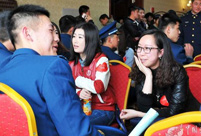 'Model husband' shatters image of love
'Model husband' shatters image of love
 Can animals smile? Or put on a happy face
Can animals smile? Or put on a happy face
 Geng Xuan crowned at 9th China Super Model Contest
Geng Xuan crowned at 9th China Super Model Contest
 Top 10 billionaires in the liquor industry
Top 10 billionaires in the liquor industry
 Backstage at China Fashion Week
Backstage at China Fashion Week
 Ballerinas anywhere but onstage
Ballerinas anywhere but onstage
 Top 10 safest airlines in the world
Top 10 safest airlines in the world
 Posters of 33rd HK Film Awards unveiled
Posters of 33rd HK Film Awards unveiled
 Top 10 most popular instant messaging apps in the world
Top 10 most popular instant messaging apps in the world
 Inspiring shadow images of Chinese army
Inspiring shadow images of Chinese army
 |
| Chinese President Xi Jinping (C) shakes hands with European Council President Herman Van Rompuy (R) and Jose Manuel Barroso, president of the European Commission, during a photocall in Brussels, Belgium, March 31, 2014. Xi attended a work banquet held by Herman Van Rompuy here on Monday. (Xinhua/Pang Xinglei) |
Chinese president Xi Jinping has concluded his 11-day European trip – a visit that has drawn worldwide attention to China-EU relations. Ling Qichao, the late Chinese philosopher, defined China's triple identities: China's China, Asia's China, and the World’s China. The European Union asserts that the unity of pluralism also has three identities: the EU's EU, Europe's EU, and the Global EU. There are three perspectives to China-EU relations: bilateral, China and West, and global, indicating that China- EU cooperation has a triple strategic impact.
First: complementary cooperation
Europe was the cradle of the industrial revolution, and China is the country with a new mode of industrialization. Europe has proposed a strategy for 2020 that aims to replace old facilities with a digital infrastructure, but due to the financial crisis, some European countries have had difficulty in implementing their plans, while China's overheated investment in capital construction offers a rare opportunity to Europe. EU cities such as London, Frankfurt, and Luxemburg have developed their financial services industries; they are natural partners for China in internationalizing the RMB and in financial services development. They all aspire to becoming a hub for RMB offshore business, yuan clearing banks, and issuers of yuan-bonds. All this indicates that China-EU relations remain complementary, which will reinvigorate competitiveness and promote China-EU economic and trade cooperation.
Second: a model of Asia-EU cooperation
During Xi Jinping's visit to the EU headquarters, China issued a policy paper on the EU: Strengthen the China-EU Comprehensive Strategic Partnership for Mutual Benefit and Cooperation. With an eye on increasing transport relations, the two sides have also decided to develop synergies between China's Silk Road Economic Belt initiative and EU policies, and to jointly explore common cooperation initiatives along the belt.
The EU's strategic objective is to create a single economic zone stretching from Lisbon to Vladivostok. China has presented visions of a 21st century maritime Silk Road and Silk Road economic belt into Europe, whose final destination is Europe, so both parties have common ground. China and the EU have held talks on a comprehensive Sino-EU investment agreement covering investment protection and market access, and are expected to sign a free trade agreement when all conditions are suitable, so there will be great prospects for an integrated Eurasian market.
Third: an example of global cooperation
Tensions between China and Japan and suspicions between China and the U.S. have added value to the Sino-EU relationship. The EU needs to guard against the threat of U.S. hegemony; Sino-EU agreements in services and IT, and strategic cooperation on RMB internationalization and investment are apt responses to the threat, and to any risk to the flow of goods by sea.
China should take advantage of the opportunity to join with the EU in actively participating in Asia-Pacific affairs, and in making decisions of global import.
The EU wields considerable influence over international regulations and standards, as well as determining the prices of bulk commodities. It also has strengths in IT, materials, solar power, and high-technology services; so the EU is an ideal partner for China's participation in global competition.
China is bolstering comprehensive reform, the EU is emerging from crisis into recovery. It is natural that China-EU relations will have an enormous strategic impact and offer great potential for further development, while becoming an important force to promote a peaceful and prosperous world.
The article is edited and translated from 《王義桅:當中國夢遇到歐洲夢》, source: Haiwainet, author: Wang Yiwei
 Wonderful moment of China's airborne forces
Wonderful moment of China's airborne forces Bai Baihe shoots for fashion magazine
Bai Baihe shoots for fashion magazine Red terraced fields in Dongchuan of Yunnan
Red terraced fields in Dongchuan of Yunnan Jiaju Tibetan Village
Jiaju Tibetan Village Spring dating
Spring dating Confucius institute at UC Davis
Confucius institute at UC Davis Little painted faces at temple fair
Little painted faces at temple fair Top 10 safest airlines in the world
Top 10 safest airlines in the world Foreign students at China-Myanmar border
Foreign students at China-Myanmar border The backstage of the Fashion Week
The backstage of the Fashion Week College students in Han costumes
College students in Han costumes Postgraduate works as waitress
Postgraduate works as waitress Life in a Lahu village in Yunnan
Life in a Lahu village in Yunnan An orphan’s wedding
An orphan’s wedding Hollywood documentary brings Diaoyu Islands truth to new audience
Hollywood documentary brings Diaoyu Islands truth to new audienceDay|Week|Month